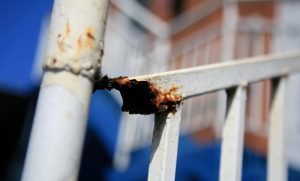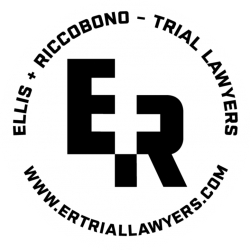TRUSTED PREMISES LIABILITY ATTORNEYS

In California, landowners and possessors (such as renters) have a legal duty to maintain safe conditions on their property to protect visitors and even individuals outside the property in some cases.
Property owners and building managers must maintain safe premises to prevent serious injuries including:
- Broken or missing handrails
- Dangerous driveways
- Improperly constructed scaffolding
- Reckless use of cranes
- Slippery surfaces
- Poor signage
- Unsafe floorboards
- Raised and worn carpeting
- Cracked sidewalks
At Ellis Riccobono, LLP, our experienced premises liability attorneys are here to help you understand your rights and navigate your case.
Common Examples of Premises Liability
Premises liability encompasses a wide range of scenarios where property owners or managers fail to maintain safe conditions, resulting in injuries. The law mandates specific safety standards and responsibilities to prevent accidents and protect individuals from harm. These requirements are essential in various contexts, including residential, commercial, and public properties. Property owners must adhere to these standards to ensure the safety of all who enter their premises.
If you or someone you care about has suffered an injury due to hazardous property conditions, reach out to Ellis Riccobono, LLP for a complimentary consultation. Our seasoned premises liability lawyers are dedicated to defending your rights and obtaining the compensation you are entitled to.
Contact Our Firm to Learn More
If there is no recovery, then there are never any fees or costs to you.
For instance, the law requires:
- Staircases and stairways must meet minimum safety requirements imposed by building codes (ie. rise and run of the stair, or length of handrails).
- Construction sites have to maintain and operate the site in a safe manner to avoid foreseeable injury. Safety rules must be followed to ensure the safety of those onsite, and those nearby. Fall protection for trenches, scaffolding, skylights and roofs may be required. Protection from falling equipment/materials and electrical hazards are also other areas that require the attention of those controlling the land.
- Trees have to be maintained so that falling limbs don’t hurt people and roots don’t create hazards for pedestrians on sidewalks, or those using an adjacent road.
- Lighting has to be adequate to enable safe use of the land.
- Electrical systems have to be maintained to prevent electrocution
- Stores, and other areas open to the public have to take reasonable steps to insure that walking surfaces are not dangerously slippery and do not have changes in elevation that create tripping hazards.
- Balconies must be constructed and maintained to prevent a fall from height.
- Railings must meet required specifications to prevent a fall from height.
- Security measures might have to be used to prevent third parties from entering land and causing harm if conditions of foreseeability can be established.
- Pools might have to have safety measures installed (like a pool fence with a childproof lock) to prevent drownings.
We handle various types of premises liability claims, including:
- Slip and Fall Accidents: Commonly occur due to hazardous conditions like standing water, waxed floors, and objects in walkways.
- Amusement Park Injuries: Injuries at amusement parks, theme parks, and zoos, including roller coaster accidents and water-related injuries.
- Swimming Pool Accidents: Injuries at public or private pools, including slip and fall accidents and near-drowning incidents.
- Elevator and Escalator Accidents: Injuries from improperly maintained or inspected elevators and escalators.
- Inadequate Security Injuries: Injuries resulting from lack of reasonable security measures like locks, cameras, and guards.
Common Locations for Premises Liability Accidents
Accidents can occur almost anywhere, especially in locations where property owners or managers fail to maintain safe conditions. These incidents often result from negligence, such as not repairing hazards or providing adequate warnings. Here are some of the most common locations where premises liability accidents happen:
- Grocery Stores and Retail Stores: Slippery floors from spills, uneven flooring, and obstacles in aisles can cause slip and fall accidents.
- Malls and Parking Lots: Poor lighting, cracked pavement, and insufficient security measures can lead to accidents and injuries.
- Parks and Playgrounds: Unsafe equipment, poorly maintained grounds, and lack of supervision can result in serious injuries, especially to children.
- Public Properties and Schools: Inadequate maintenance of walkways, buildings, and recreational areas can cause accidents involving both students and visitors.
- Restaurants, Nightclubs, and Bars: Spills, cluttered walkways, and inadequate security measures can lead to slip and fall accidents, as well as incidents involving violence.
- Apartment Complexes and Office Buildings: Broken stairs, faulty elevators, and unsafe common areas pose significant risks to tenants, visitors, and employees.
In each of these locations, property owners and managers have a legal duty to ensure the safety of their premises. When they fail to meet these obligations, resulting in injuries, they can be held liable under premises liability laws.
Our experienced attorneys at Ellis Riccobono, LLP are skilled in handling cases across these varied environments, ensuring that victims receive the compensation they deserve for their injuries.
California Premises Liability Laws
California premises liability laws are grounded in the principle of negligence, requiring property owners and occupiers to maintain a safe environment for visitors. This legal framework holds individuals and entities accountable for injuries that occur due to their failure to exercise reasonable care in managing their property. Under California Civil Code 1714(a):
“Everyone is responsible, not only for the result of his or her willful acts, but also for an injury occasioned to another by his or her want of ordinary care or skill in the management of his or her property or person…”
This means that property owners and possessors (including renters) must take proactive steps to ensure their premises are free from hazards that could potentially harm others. This duty of care extends to various aspects of property maintenance and safety, including:
- Routine Inspections: Regularly checking the property for potential hazards, such as broken stairs, uneven walkways, or faulty electrical systems.
- Timely Repairs: Promptly addressing and repairing any identified issues that could pose a risk to visitors, such as fixing loose handrails, repairing cracks in sidewalks, or replacing burnt-out lights.
- Adequate Warnings: Providing clear warnings about any temporary hazards that cannot be immediately fixed, such as wet floor signs or barriers around construction areas.
- Security Measures: Implementing reasonable security measures to protect visitors from foreseeable crimes, such as installing locks, security cameras, and adequate lighting.
- Compliance with Regulations: Ensuring the property meets all relevant safety codes and regulations, including those for building, fire safety, and health standards.
Failure to meet these responsibilities can lead to serious injuries, ranging from slip and fall accidents to more severe incidents like drownings or electrocutions. Victims of such negligence have the right to seek compensation for their injuries, which can include medical expenses, lost wages, pain and suffering, and other related damages.
Establishing Liability and Seeking Compensation in Premises Liability Cases
To establish premises liability, a plaintiff must demonstrate that the property owner or occupier’s negligence directly led to their injury. This involves proving several key elements:
- Ownership or Control of the Property: The plaintiff must show that the defendant owned, rented, or managed the property where the injury occurred. This establishes the defendant’s responsibility for maintaining the property in a safe condition.
- Negligence in Property Maintenance: The plaintiff must provide evidence that the defendant was negligent in maintaining the property. This could include failing to repair hazardous conditions, not providing adequate warnings about potential dangers, or neglecting routine inspections and maintenance.
- Injury Resulting from Negligence: It must be proven that the plaintiff was injured as a direct result of the defendant’s negligence. This means showing a clear link between the unsafe condition and the injury sustained.
- Causation: Finally, the plaintiff must demonstrate that the defendant’s negligence was a significant factor in causing the injury. This involves proving that the injury would not have occurred if the defendant had exercised reasonable care in maintaining the property.
When these elements are successfully established, the plaintiff may be entitled to seek compensatory damages. These damages are intended to cover a variety of losses and expenses resulting from the injury, including:
- Medical Bills (Current and Future)
Compensation for all medical expenses incurred because of the injury, including hospital bills, surgeries, medications, and ongoing medical treatment or physical therapy. - Lost Wages and Earning Capacity
Reimbursement for lost income due to the inability to work following the injury. If the injury has long-term or permanent effects on the plaintiff’s ability to earn a living, they may also seek compensation for diminished earning capacity. - Pain and Suffering
Damages for the physical pain and emotional distress caused by the injury. This can include compensation for ongoing suffering and any negative impact on the plaintiff’s quality of life. - Scarring or Disfigurement
Compensation for any permanent scars or disfigurement resulting from the injury. This type of damage considers the lasting physical and psychological effects of visible injuries.
If you or a loved one has been injured due to unsafe property conditions, contact Ellis Riccobono, LLP today for a free consultation. Let our experienced premises liability attorneys fight for your rights and secure the compensation you deserve.
